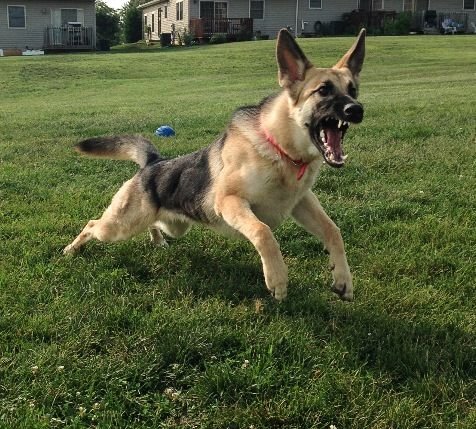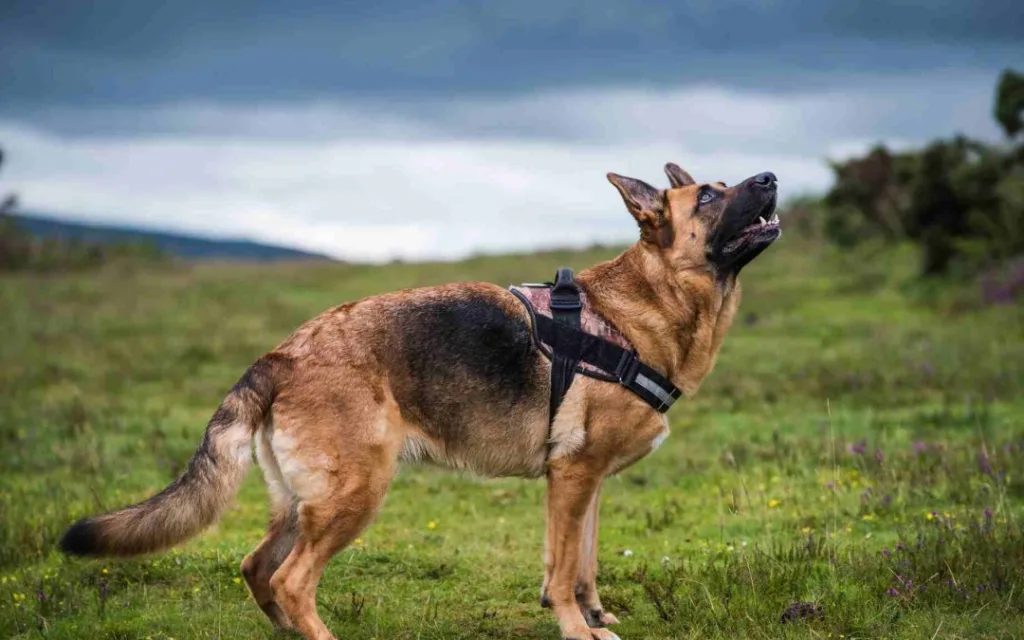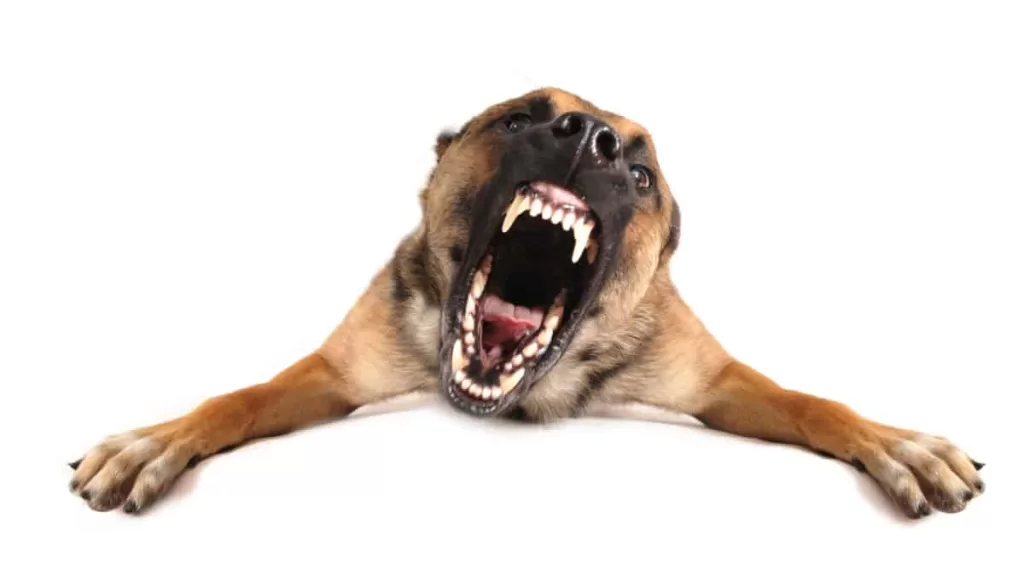German Shepherd dog acting weird? If you observe situations like a dog acting weird in your daily routine, you may be wondering why and what it can do about it. In this post, I’ll show you why dogs can start acting weird and what you can do about it.
Table of Contents
So, why is my dog behaving strangely? Causes such as illness, injury, being in a new environment, a problem with diet, change in daily routine, abuse, or boredom.
There are actually many reasons for your dog acting weird and it may be due to a combination of them.
However, there are also many things you can consider when identifying the main cause and there is a lot you can do about it.
Why is your Adult German Shepherd dog acting weird?

The following are common causes for dogs to start acting awkward and may be the reason why yours is doing it.
Illness or injury
The reason is that it is an illness or an injury. If it suddenly starts to work weirdly, it shows crying, hiding, other signs of illness or injury or it is too much if it is too active. If illness or injury is found to be the cause, taking it to the vet is the best option.
New climate
If you have recently adopted your dog, you are not sure about its new environment. In this case, it should start to improve over a period of weeks or months.
It helps to give positive attention in the form of training, exercise and play. If it does not improve it may help to get help from a vet or dog behaviorist.
Stress or depression
The reason for doing this may also be that something has been stressful recently. It can be stressful if it starts behaving weird after an incident.

Such incidents may include the death of the owner or another pet, the addition of another pet to the family, or the relocation of homes.
In this case, it should improve over a period of days or weeks. It helps to give positive focus through training, exercise and playing with it. If this does not improve, it may be helpful to seek help from a vet or dog behaviorist.
Fear
There may be a context in which something causes fear. At times when there are fireworks, sirens, or outside construction work it is too much to do.
In this case, it may be helpful to try to eliminate the frightening content or desensitization training if possible.
Boredom
Dogs are usually meant to exercise on a daily basis. When dogs do not get enough exercise it can behave strangely and that may be why yours is doing it. It’s too much if yours starts behaving weirdly from getting less exercise.
Diet problems
It can also be said that there is a problem with its diet. It may be eating things that should not be, not getting the right nutrients in its diet or eating too much or not getting enough of it.
It’s too much if it’s starting to work weirdly since a change in its diet or eating what it should not have.
In this case, it helps to consult with your veterinarian about its diet when you see them, make sure no one else has fed it and you can look here for advice on what to feed it.
Encourages behavior
Behavior can also be the context in which you encourage it by giving it the items you want when it behaves that way. If you give feasts, toys or extra attention, when it works awkwardly, it may cause you to do more to get more gifts.
Instead, it helps to encourage you to behave the way you want to by giving a gift when it shows signs of behaving that way and to follow the other tips below.
Someone was abusive
The reason may be that someone is abusing. If it suddenly starts to act weird, it’s too much if you miss some people or if you know someone has been aggressive towards it recently.
In this case, it helps not to be put in a state of being abused again and to be given positive attention on a regular basis.
If its behavior does not improve over the course of days or weeks, it may be helpful to seek help from a dog behavior expert.
Sounds
The reason is that it can hear unpleasant sounds. This is a lot more if you can do more at certain times when construction work or fireworks are out.
In this case, it may help to reduce the noise level or use desensitization training.
Change in its routine
Dogs generally like to have a consistent routine and cause them to behave strangely when their routine is damaged.
This may cause yours to behave strangely. It’s a lot more if you start doing this since it’s changed its routine.
Changes may include walking at different times, feeding at different times, or waking up at different times.
Separation anxiety
Another reason for this is the division concern. This is most likely if you are left alone for a long time and start to worry when you leave.
Also Read: German shepherd Separation Anxiety: Symptoms and Medication
In this case, it helps to try to keep it alone for as little time as possible.
Humble behavior
If your dog has been misbehaving recently and you are mad at it, your dog will behave strangely because it will be submissive.
If it is trying to prevent you, it is too much if it shows other signs of submissive behavior and it hurts.
What to do about your dog acting weird?
Below are some options you may have when your dog behaves awkwardly.
Take him to the vet
If it shows signs of illness or injury, it has been acting that way for a long time or is behaving very strangely, the best option is to take it to the vet. By doing so, you should be able to rule out medical reasons and seek expert advice tailored to your particular dog.
Get help from a dog behavior expert
If there are no medical issues, getting help from a dog behavior specialist is another option. By doing so, you will be able to see why it behaves that way and how to stop it.
Avoid encouraging that behavior
As mentioned above, you are encouraging behavior by giving it the objects it wants when it works that way. Instead, it helps you to be rewarded when you behave the way you want to, to avoid behaving awkwardly before giving a gift, and to give positive reinforcement training.
Make sure he is getting the right diet
It also helps to ensure that it is eaten properly, that no one else eats it, and that it does not have access to things it should not eat.
This post may contain affiliate links. Affiliates can pay a commission to the GSD site from the companies mentioned in this post. It does not affect the price you pay and we are very grateful for any support.
Why is my German Shepherd suddenly scared of everything?
We understand your concern about your German Shepherd suddenly displaying fearful behavior. This change in behavior can be distressing, but it’s essential to approach the situation with care and understanding. There are several possible reasons for a dog to become suddenly scared of everything, and it’s crucial to identify the root cause to help your dog and ensure the safety of everyone involved.
Possible Reasons for Fearful Behavior:
- Medical Issues: Always consider the possibility of an underlying medical problem. Pain or discomfort can make dogs fearful, so a visit to the vet is a good first step to rule out any health concerns.
- Past Trauma: Dogs can develop fear or anxiety due to previous traumatic experiences, such as abuse, accidents, or negative interactions with other animals.
- Age and Development: Dogs, like humans, go through different stages of development. Fear periods are common in puppies, and sometimes dogs can exhibit fearful behavior during adolescence.
- Lack of Socialization: Inadequate socialization during the critical puppy stages can lead to fear of new environments, people, and situations.
- Changes in the Environment: Changes in the household or environment can also trigger fear. New people, pets, or even changes in routine can be stressful for dogs.
- Loud Noises or Thunderstorms: Fear of loud noises like thunderstorms or fireworks is a common issue among dogs.
Safety Measures:
- Consult a Veterinarian: As mentioned earlier, consult your vet to rule out any medical issues causing the fear. If there are no medical concerns, they can guide you on behavior modification strategies.
- Professional Training: Consider working with a professional dog trainer or behaviorist who specializes in fear and anxiety in dogs. They can help you identify triggers and develop a tailored training plan.
- Create a Safe Space: Provide your dog with a safe, quiet space where they can retreat when feeling fearful. This could be a crate or a designated room with their favorite toys and bedding.
- Desensitization and Counterconditioning: Gradual exposure to the fear triggers (if known) can help the dog build confidence. Pair positive experiences and rewards with these triggers to create positive associations.
- Socialization: If lack of socialization is a concern, gradually expose your dog to new people, animals, and environments in a controlled and positive manner.
- Positive Reinforcement: Use positive reinforcement techniques to reward calm and brave behavior. Treats, toys, and praise can be powerful motivators.
- Stay Calm and Patient: Your dog can pick up on your emotions. Stay calm and patient, avoiding punishment as it can worsen fear.
- Medication: In severe cases, medication prescribed by a veterinarian may be considered as part of the treatment plan.
Remember that overcoming fear and anxiety in dogs may take time and consistent effort. Each dog is unique, and it’s essential to be empathetic and understanding throughout the process. Always prioritize your dog’s safety and well-being and consult with professionals when needed. Your dedication and support can help your German Shepherd regain their confidence and live a happier, less fearful life.

